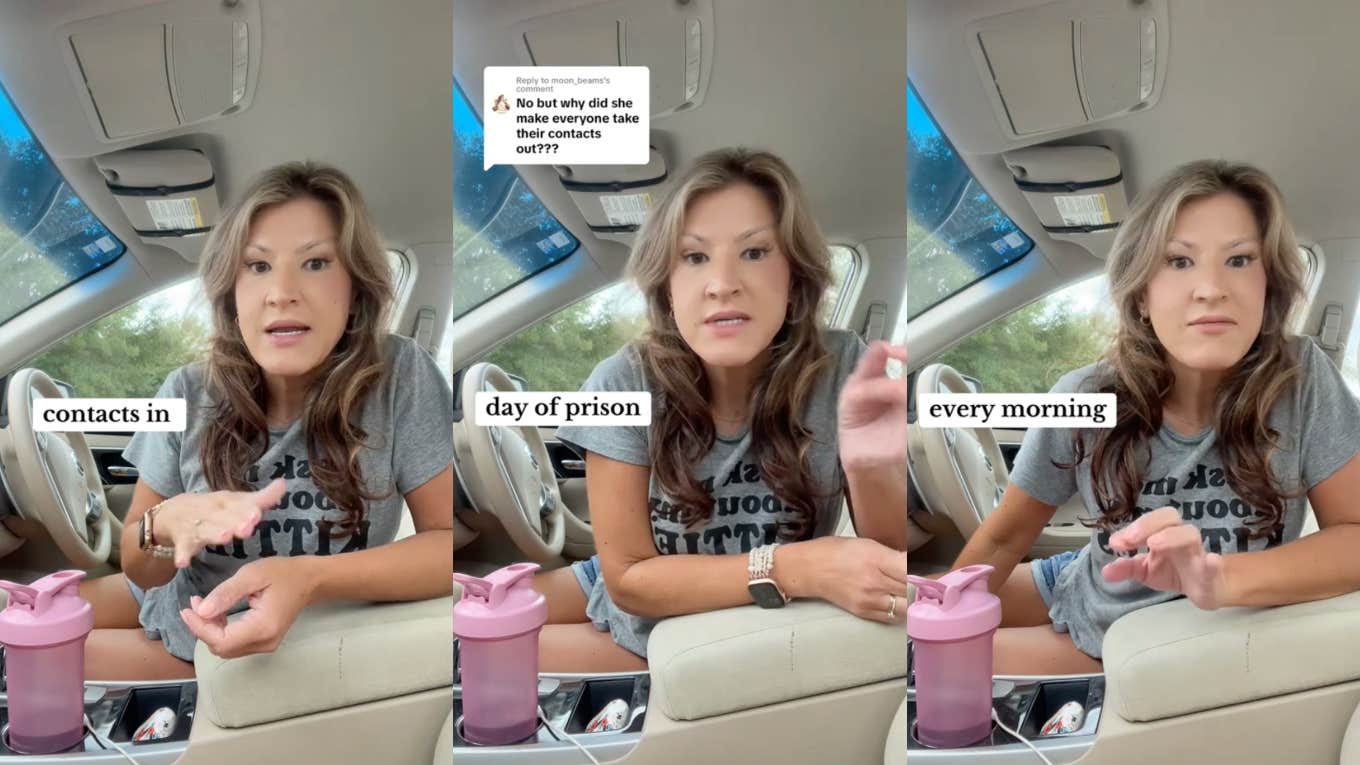A Formerly Incarcerated Woman Explains What Would Happen To Women Who Wore Contacts In Prison
"Those girls had to go their entire incarceration either without being able to see."
 @prison_story / TikTok
@prison_story / TikTok Oftentimes we can have a skewed understanding of the life of an incarcerated individual and all of the hardships and bleak reality that accompany being behind bars. A content creator named Amanda Dove has dedicated her TikTok platform to sharing the experiences and stories she has from her time in prison after being convicted of armed robbery.
In one of those stories, Dove explained what would happen to women in prison who wore contacts.
She recalled that women she was in prison with who wore contacts were told to take them out and weren't given replacement glasses.
Responding to a question asking her to explain a previous comment she made about the prison guards taking away women's contacts once they arrived at the prison, Dove explained that on her first day, the officers had asked if anyone was wearing contacts and to raise their hands.
"I kinda held back even though I had contacts, but I wanted to see what was gonna happen," Dove recalled, explaining that the female guard "made every single girl take their contacts out and she did not give glasses, there was no replacement. Those girls had to go their entire incarceration either without being able to see or if they were in prison for up to a year, they were allowed to apply to get glasses from the state."
Dove continued, saying that the women who applied would have to go get an eye exam, which they'd have to pay for, and would be given "state-issued prison glasses" that she remembered being these thick-rimmed, black glasses that were not the nicest looking pair.
She explained that she was forced to ask her father to send her a pair of glasses.
Despite the prison officer asking all of the women to remove their contacts, Dove refused and kept hers in until she was physically unable to wear them anymore. Since she was serving a prison sentence of five years, she knew she'd need her own pair of glasses.
"I had two contacts to start with and one of them fell out and it was gone, and then the other one was just crusty and dry. Every morning I'd wake up and it'd be somewhere deep in my eyeball, and I would try and get it back. There was no saline solution so I was just winging it," she said
Instead of going through the state, however, she ended up calling her dad and asking him to get her a pair from the outside world to send to her. It took two whole months of using her old contacts before she was eventually called into the Warden's office at the prison and given the new glasses that her dad had mailed to her.
"I was able to see for the rest of my time, but other girls, they were completely blind."
Leaving prison inmates to spend their sentencing without the ability to see is incredibly inhumane.
In the comment section, many people agreed that it was cruel to force anyone to spend sometimes years-long prison sentences without being able to see. Not only is it cruel, but also inhumane — depriving individuals of their basic necessities under the guise of "punishment" isn't the reason why prisons exist in the first place.
Women in the prison system already face unique challenges compared to their male counterparts, such as higher rates of mental health issues and sexual abuse. According to the National Institute of Health, on average, 21.2% of female inmates reported experiencing some form of sexual victimization by other inmates, while 7.6% reported experiencing that behavior by staff.
In another study conducted by the NIH, more than 80% of female prisoners and 70% of male prisoners were identified as requiring treatment regarding their mental health conditions, while half of their needs were not met.
These statistics are frightening, and forcing women to navigate the challenges of prison life while being visually impaired does nothing but exacerbate these disparities. While Dove mentioned there was a way for women to be able to go through the state and get glasses through an eye exam, it's a probability that some of those women couldn't afford the exam in the first place.
Depriving inmates of vision and other necessities isn't the right way to go about rehabilitating, and eventually, reintegrating incarcerated people into society. Dove's revelation about the inner workings of even just one prison in this country serves as a poignant reminder that this urgent path to systemic reform of any kind starts with recognizing the inherent worth of every person, regardless of their circumstances.
Nia Tipton is a Chicago-based entertainment, news, and lifestyle writer whose work delves into modern-day issues and experiences.
